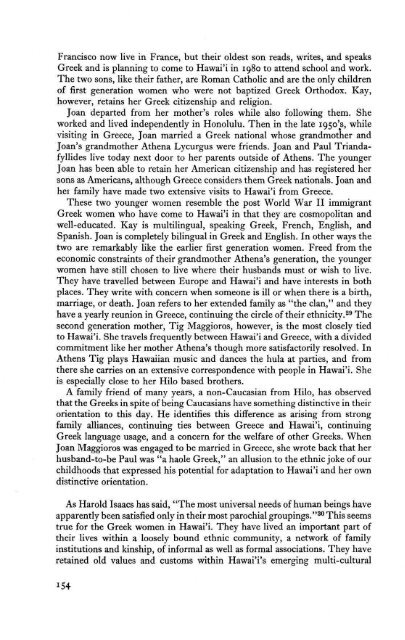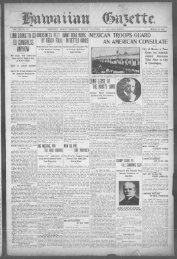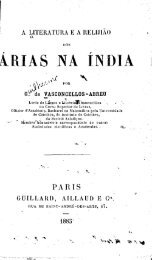From Sparta to Spencer Street: Greek Women in Hawai'i - eVols
From Sparta to Spencer Street: Greek Women in Hawai'i - eVols
From Sparta to Spencer Street: Greek Women in Hawai'i - eVols
Create successful ePaper yourself
Turn your PDF publications into a flip-book with our unique Google optimized e-Paper software.
Francisco now live <strong>in</strong> France, but their oldest son reads, writes, and speaks<br />
<strong>Greek</strong> and is plann<strong>in</strong>g <strong>to</strong> come <strong>to</strong> <strong>Hawai'i</strong> <strong>in</strong> 1980 <strong>to</strong> attend school and work.<br />
The two sons, like their father, are Roman Catholic and are the only children<br />
of first generation women who were not baptized <strong>Greek</strong> Orthodox. Kay,<br />
however, reta<strong>in</strong>s her <strong>Greek</strong> citizenship and religion.<br />
Joan departed from her mother's roles while also follow<strong>in</strong>g them. She<br />
worked and lived <strong>in</strong>dependently <strong>in</strong> Honolulu. Then <strong>in</strong> the late 1950's, while<br />
visit<strong>in</strong>g <strong>in</strong> Greece, Joan married a <strong>Greek</strong> national whose grandmother and<br />
Joan's grandmother Athena Lycurgus were friends. Joan and Paul Triandafyllides<br />
live <strong>to</strong>day next door <strong>to</strong> her parents outside of Athens. The younger<br />
Joan has been able <strong>to</strong> reta<strong>in</strong> her American citizenship and has registered her<br />
sons as Americans, although Greece considers them <strong>Greek</strong> nationals. Joan and<br />
her family have made two extensive visits <strong>to</strong> <strong>Hawai'i</strong> from Greece.<br />
These two younger women resemble the post World War II immigrant<br />
<strong>Greek</strong> women who have come <strong>to</strong> <strong>Hawai'i</strong> <strong>in</strong> that they are cosmopolitan and<br />
well-educated. Kay is multil<strong>in</strong>gual, speak<strong>in</strong>g <strong>Greek</strong>, French, English, and<br />
Spanish. Joan is completely bil<strong>in</strong>gual <strong>in</strong> <strong>Greek</strong> and English. In other ways the<br />
two are remarkably like the earlier first generation women. Freed from the<br />
economic constra<strong>in</strong>ts of their grandmother Athena's generation, the younger<br />
women have still chosen <strong>to</strong> live where their husbands must or wish <strong>to</strong> live.<br />
They have travelled between Europe and <strong>Hawai'i</strong> and have <strong>in</strong>terests <strong>in</strong> both<br />
places. They write with concern when someone is ill or when there is a birth,<br />
marriage, or death. Joan refers <strong>to</strong> her extended family as "the clan," and they<br />
have a yearly reunion <strong>in</strong> Greece, cont<strong>in</strong>u<strong>in</strong>g the circle of their ethnicity. 29 The<br />
second generation mother, Tig Maggioros, however, is the most closely tied<br />
<strong>to</strong> <strong>Hawai'i</strong>. She travels frequently between <strong>Hawai'i</strong> and Greece, with a divided<br />
commitment like her mother Athena's though more satisfac<strong>to</strong>rily resolved. In<br />
Athens Tig plays Hawaiian music and dances the hula at parties, and from<br />
there she carries on an extensive correspondence with people <strong>in</strong> <strong>Hawai'i</strong>. She<br />
is especially close <strong>to</strong> her Hilo based brothers.<br />
A family friend of many years, a non-Caucasian from Hilo, has observed<br />
that the <strong>Greek</strong>s <strong>in</strong> spite of be<strong>in</strong>g Caucasians have someth<strong>in</strong>g dist<strong>in</strong>ctive <strong>in</strong> their<br />
orientation <strong>to</strong> this day. He identifies this difference as aris<strong>in</strong>g from strong<br />
family alliances, cont<strong>in</strong>u<strong>in</strong>g ties between Greece and <strong>Hawai'i</strong>, cont<strong>in</strong>u<strong>in</strong>g<br />
<strong>Greek</strong> language usage, and a concern for the welfare of other <strong>Greek</strong>s. When<br />
Joan Maggioros was engaged <strong>to</strong> be married <strong>in</strong> Greece, she wrote back that her<br />
husband-<strong>to</strong>-be Paul was "a haole <strong>Greek</strong>," an allusion <strong>to</strong> the ethnic joke of our<br />
childhoods that expressed his potential for adaptation <strong>to</strong> <strong>Hawai'i</strong> and her own<br />
dist<strong>in</strong>ctive orientation.<br />
As Harold Isaacs has said, "The most universal needs of human be<strong>in</strong>gs have<br />
apparently been satisfied only <strong>in</strong> their most parochial group<strong>in</strong>gs." 30 This seems<br />
true for the <strong>Greek</strong> women <strong>in</strong> <strong>Hawai'i</strong>. They have lived an important part of<br />
their lives with<strong>in</strong> a loosely bound ethnic community, a network of family<br />
<strong>in</strong>stitutions and k<strong>in</strong>ship, of <strong>in</strong>formal as well as formal associations. They have<br />
reta<strong>in</strong>ed old values and cus<strong>to</strong>ms with<strong>in</strong> <strong>Hawai'i</strong>'s emerg<strong>in</strong>g multi-cultural<br />
154

















